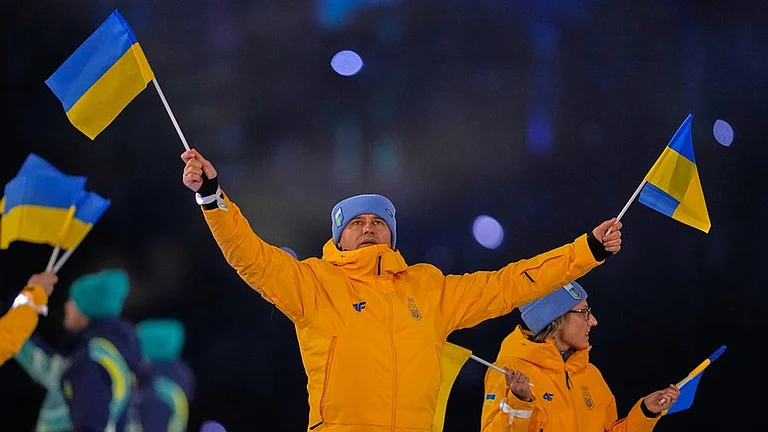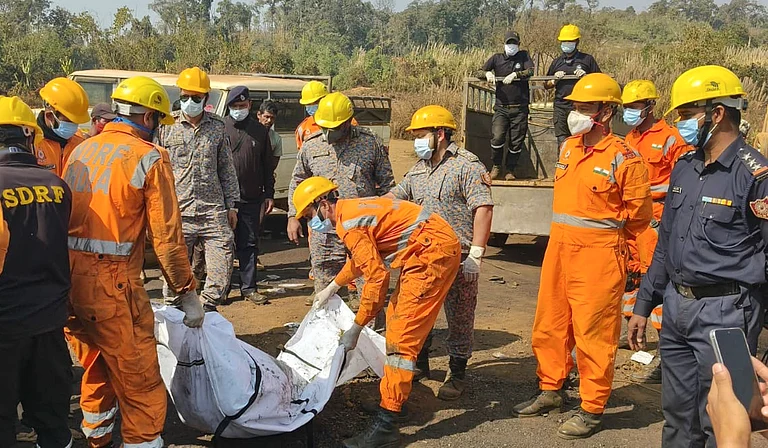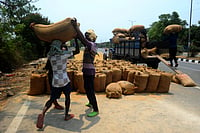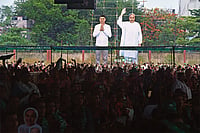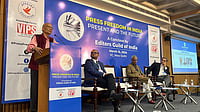Lado Sikaka is not happy to see intruders in his village - situated in the foothills of the Niyamgiri mountain - a little after 8 pm. A jeep showing up in this hamlet of about 20 mud-huts usually can only mean the arrival of police, paramilitary or other government officials. When told that we have come to discuss the locals’ decision to boycott the ongoing ‘festival of democracy’ or the ‘largest elections in the world’, he still seems irritated, “I don’t speak Hindi,” he tells us tersely.
Lado is seated in the verandah of his tiny house, as men and women come out of their houses to find out what is happening. These members of the Dangaria Kondh tribe are sitting on top of some of the largest bauxite reserves in the world. And yet, they have successfully defended their forests and mountain – sacred to them as they are to the cash-rich corporates and parties eager to funnel the ensuing wealth towards ‘development’ elsewhere – from being dug away for two decades now.
After years of protests, digging up roads that would have taken trucks and surveyors to the holy mountain – called Niyamraja by the Adivasis – and facing state repression and cases, the Kondhs were vindicated in 2013 when the Supreme Court in a landmark judgment held that this particularly vulnerable tribal group (PVTG) had “cultural, religious and spiritual rights” on the hill, and ordered a referendum in the affected Gram Sabhas to obtain consent on the project.

Despite massive state pressure, police presence, lucrative offers of compensation by the Vedanta group – the United Kingdom-based company that was supposed to operate the mine – all 12 gram-sabhas spread across Kalahandi and Rayagada districts voted against the project, often unanimously, in July 2013. This was a first-of-its-kind environmental referendum in the country, where locals were allowed to decide the fate of their surroundings.
Nearly 11 years later, a lot has changed in the foothills. As we drive down from Bhawanipatna, the district headquarters of the Kalahandi district, roads are being widened almost during the entire stretch, and we pass two CRPF camps, surrounded by barbed wire and starkly different from the tiny villages that appear here and there among dense forests and hills. It takes us four hours to reach Lado’s village Lakhapadar. Before 2021, it would have taken us that much time just to cover the last 11 kilometres on foot, climbing the mountain from Parsali, the gram panchayat headquarter. Now, it takes less than an hour on a thin asphalt road with thick vegetation on each side, though we do lose our way a couple of times and come upon dead ends. Our jeep is the only vehicle on the road throughout this time.
It is the night of May 12, a day ahead of polling in four parliamentary constituencies and 28 assembly seats southwestern Odisha, including the Koraput Lok Sabha seat and Lanjigarh assembly seat that cover these hamlets. Even before we land in Odisha, a couple of videos reach our WhatsApp inbox, featuring Lado issuing a statement to local journalists announcing the boycott – in the local Odia dialect – while woman activist Minjali details the alleged harassment by the police, with her being declared a Maoist and a reward being announced for her capture.
Minjali speaks in Kui, the language of the Kondhs or Kandhas. The tribe, long used to dealing with the government and approaching the media and activists due to repeated arrests and protests, knows that an election boycott always makes news, no matter how remote the villages.
“Not much has changed in these 11 years. It’s just glitter (the changes). Combing (operations by the paramilitary) continues on the Niyamgiri. The police come and surround the villages. They tell us not to access certain parts of the forests,” Lado says in the verandah of his house, as the space between the rows of houses is lit by solar-powered lights. It can hardly be called a street, made of rocky terrain and visible signs of a stream that must flow downhill, as the village perches on a steep slope. The demand for a cement-paved street remains unfulfilled, the leader reveals.
The latest flashpoint between the administration and the activists of the Niyamgiri Surakhyaa Samiti (Niyamgiri Protection Committee) – the organisation that includes both Dangarias and civil society activists from nearby towns – began in August 2023, when locals Krushna and Bari Sikaka were “abducted” by plainclothesmen from Lanjigarh weekly market.
“On August 5, 2023, I had gone to help make arrangements for celebrating the World Indigenous Day in Lanjigarh (on August 9). Plainclothesmen picked me up from the market, and blindfolded me. They took me to a building, and accused me of helping the Maoists, repeatedly asking me to confess. I kept telling them that I had not seen or know any Maoists, and that I am an Adivasi activist fighting to protect our land, forest and water,” Krushna, whose given name is Laske, tells us in Patangpadar, an even smaller village situated a stone’s throw away from Lakhapadar.

Villagers gathered in protest at the Kalyansingpur police station the next day, after the police denied the arrests, and submitted a memorandum for the two young men’s release and asking for their whereabouts. Things came to a boil when the police tried to arrest Drenju Krisika, a prominent leader of the NSS, when the Adivasis were returning from the protest. A clash took place, and by the evening the police lodged an FIR against nine people, invoking the controversial Unlawful Activities Prevention Act (UAPA) against the leaders. Although the UAPA charges were withdrawn later by the Odisha government, ostensibly with an eye on the approaching elections, the leaders continue to face other cases related to the protest.
Krushna, 23, was subsequently charged under a rape case dating back to 2018, when he would have been just 18, and vehemently denies his involvement. “After a long ordeal, I was finally granted bail but the case continues. People like Lado and Drenjo have tens of false cases pending against them. So many of them have spent time in jail. One of them spent four years in prison. At least 50-60 people from our community have cases pending,” he reveals.
Activists claim that the key reason behind the police actions against the local tribals remains the area’s rich bauxite reserves, which have been auctioned by the Odisha government in recent years, though actual mining has not begun and stiff resistance is expected from villagers. Even though Vedanta’s bid for the proposed Niyamgiri mine was thwarted, other mining blocks in the area, such as Kutrumali, Sijimali and Khandualmali - spread over the Kalahandi and Rayagada districts - have been auctioned off in recent times.
Vedanta, which runs a massive aluminium refinery near Lanjigarh that currently processes bauxite imported from other states and countries, announced in 2023 that it had secured the bid for the Sijimali bauxite block with estimated reserves of 311 million tonnes. Similarly, a subsidiary of Adani enterprises has secured the lease for the Kutrumali hills, said to have geological reserves of 128 million tonnes. When officials of a company that sub-leased the Sijimali bloc from Vedanta reached a hilltop to inspect the proposed site of the mine last year, hundreds of villagers gathered in protest and a standoff ensued.
“None of the mainstream parties are ready to back the movement against the mines. Even the Congress, which supported the Niyamgiri referendum, said last year that development cannot take place if all the mines are opposed,” says Lingaraj Azad, the Bhawanipatna based adviser to the NSS, who was one of the people charged under the UAPA last year. He says that the electoral boycott by the Niyamgiri villages is based on the fear that once the other mines begun to get exploited, eventually their own hill would also be dug up, and their lives – dependent on the forest – disrupted.
However, Azad himself is not part of the boycott, having carried out a campaign in the district to vote against both the Bharatiya Janata Party and Biju Janata Dal, calling them B-teams of each other.
Lado, who sets off for the forest at 4 am like other members of the village to gather mangoes and other produce, says the four villages closest to the mountain have decided to take part in the boycott. Even though the odd mobile phone and motorcycle has reached these villages along with the solar panels, their lives follow the same pattern, climbing up the mountain every day to gather items that they sell in the local market, and raising animals like pigs, chickens and goats. A self-organised “school”, the only brick building in Lakhapadar, is run by volunteer activists and locals, while a few young men like Krushna have also accessed formal education up to high-school.

Both Lado and Krushna say they are not opposed to “development,” but want it on their own terms, such as the road, which was deliberately limited to a single-lane by the activists so that the entry of trucks could be prevented. Lado lists a primary healthcare centre and an anganwadi or a rural child-care centre as some of the government initiatives that he would like to see.
“It makes no difference whether we vote or not. The lack of amenities, rights continues. We will think about voting only when we get our rights as independent Indians, citizens of the republic,” says the surprisingly articulate Krushna.
As the day breaks, we begin our drive down the mountain, with the road being empty for the first few kilometres. However, soon we see a line of Adivasi men and women walking down the road towards Parsali. At first we think they might be headed to the weekly market in Narayansingpur, held on Monday. However, we are hailed down by Jayanti, a resident of Gumma, who says she is on her way to cast her vote. Gumma is a mixed-population village and Jayanti, a Dalit, says she will vote for Jitu Jagasika, the MLA candidate of the Bahujan Samaj Party. Jagasika, a Kondh who was part of the NSS in its initial days, had joined mainstream politics soon after, and continues to hold influence in some of the villages.
As we reach Parsali, the polling booth has a huge queue inside, and the officials reveal that around 100 of the 1,111 registered voters have already voted by 9 am. Outside the polling booth, local workers of political parties are seen explaining symbols of various parties to the tribal first-time voters. The boycott is clearly not effective here, though when asked about the reasons for voting for their preferred candidates, most locals cite allegiances to Jitu and other local leaders. Most of them say they voted for the BSP in the assembly polls and the Congress in Lok Sabha, whose tribal leader Saptagiri Sankar Ulaka is the incumbent MP from Koraput.

On the way to Lanjigarh, we see schools, anganwadis and hospitals run by Vedanta, most of them shut, and a huge township that houses those employed in the aluminium refinery. Voting is in full flow everywhere, with Congress appearing to hold an edge. The hamlets where we spent the night, surrounded by lush greenery and the sounds of crickets and roosters, appear more distant than the 40-odd kilometres that we have travelled .
As the country votes in elections considered key for its future by many, the four tiny villages of Niyamgiri have continued to defy the conventional meaning of democracy and development, dictated by GDP growth and the “greater good” as defined in the rapidly growing urban-centric economy of the country. The future of their resistance appears uncertain, in a state where mining has brought much sought-after revenue, part of which has been used to fund popular welfare schemes. The call to save the environment, not just for the Adivasi communities but for all the future generations, fails to attract political or legal backing, bar a few exceptions like the 2013 judgement.







